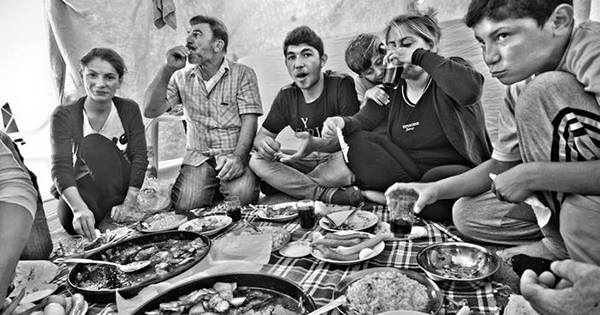Tovmasian family: “After Kobane, our final landmark is Armenia”

Hayern Aysor’s correspondent sat down for an interview with members of the Tovmasian family, who were saved from the terrorist act of ISIS in the Syrian city of Kobane. On September 2, the 17 members of the family moved to Armenia at the initiative and with the support of the RA Ministry of Diaspora and are temporarily staying at the Social Home located in the Silikyan District of Yerevan.
It was clear that the multi-member family was in solidarity just by seeing them from the entrance. The women were busy in the kitchen, the girls were cleaning the apartment, the men were engaged in a conversation around the table, and the children were playing in the yard. What was interesting was that everyone greeted us with smiles and open arms, concealing the sorrow and melancholy in their souls…
Our conversation began with memories of the once peaceful and carefree days that the family would spend in Kobane.
Ilona Tovmasian said they lived in peace in Kobane. The Kurds and Arabs never pressured the family members for being Armenian. They would always treat them well and help them in case of need. Overall, there were eight Armenian families in Kobane, and there were well-known doctors among them. Most of the members of the Tovmasian family had jobs and earned a living.
When ISIS terrorists entered Kobane, burned homes and killed people on September 28, 2014, the Tovmasian family (the families of the four Tovmasian brothers and their 11 children) were lucky to be able to escape and seek paths to take shelter.
Having escaped tortures and facing death, the family managed to reach the border with Turkey. The Turkish border guards allowed them to enter Turkey (Suruj) where they were provided with a place to stay in the building of a boarding school. The family overcame several obstacles as it stayed in the school for three months, after which UNICEF set up tents for the refugees and transferred everyone to the camps.
During their seven-month stay at the Suruj Camp in Urfa, the Tovmasians didn’t complain about anything, never felt hungry or thirsty, and the Turks treated them well. They only suffered during the summer since it was very hot in the tent.
However, they didn’t complain because there are nearly 100,000 refugees staying in 30,000 tents, and most of them were Kurds and Arabs.
During the days at the camp, General Vicar of the Armenian Patriarchate of Constantinople, Archbishop Aram Ateshian visited the family and expressed his willingness to do everything possible to help them move to Armenia.
“We were all impatiently waiting to hear this news because we were also considering that. No matter what happens, our final landmark is Armenia, and we need to settle here,” said Mrs. Ilona.
When asked how they feel during their first days in Armenia, the Tovmasians said: “We’re happy to be in Armenia, our Homeland. We had been dreaming of this day, and Yerevan is very beautiful. We simply have trouble adapting to the environment and rediscovering ourselves, but we’re not losing hope. We’ll overcome the difficulties over time. For now, we’re calm in the sense that we’re safe and have a roof over our heads. The most important thing is that we won’t be waiting to hear bombings every minute, and at least the children will be able to sleep in peace.”
Even in this difficult psychological situation, they haven’t lost their sense of humor and are able to make jokes. “Whenever we need something, we get afraid of leaving the house, thinking we’ll get lost and nobody will find us, but some of our neighbors have already visited us and gotten to know us,” the girls said, laughing.
Currently, the Tovmasians are concerned about housing and employment so that they can live at ease. They also need medical and psychological assistance since some of the members have health problems. Hagop’s son has an innate inability to speak and is already seven years old, and one of Feruz’s legs has been decapitated due to gangrene.
Ilona’s 13-year-old son has been in distress ever since ISIS terrorists killed his father in front of his eyes. When Kobane was in peace, the father and son returned to Kobane to renovate their house and store so that the family could return, but after a couple of days, the terrorists entered Kobane again and killed peaceful civilians.
After that, the boy can’t forget seeing how his father stopped breathing and how he was bleeding. He has become self-contained, jumps out of bed at night and doesn’t communicate with his family members very much. He escaped and reached his relatives in Turkey by a miracle.
Turkish soldiers buried Ilona’s husband’s body, and three months after his death, the men of the family went to Kobane, found the tomb, placed a cross on it, wrote the name and last name of the deceased and returned to Turkey.
During the entire interview, the Tovmasians were speaking in Armenian clearly and beautifully. When asked how they had been able to preserve the native language in the Kurdish-speaking city of Kobane, they all replied: “When we were living in Kobane, we never stopped speaking in Armenian with each other. It was a major condition in our family. We even made our children speak in Armenian so that they wouldn’t forget their native language. That will help them preserve their national identity as well.”
The story of the Tovmasian family is truly no different from the stories of Armenian families having migrated, robbed and massacred in 1915. However, the Tovmasians migrated and reached Armenia, and what’s symbolic is that they settled in the homeland in 2015, the year marking the 100th anniversary of the Armenian Genocide.
Gevorg Chichyan




 Արևելահայերեն
Արևելահայերեն Արևմտահայերեն
Արևմտահայերեն Русский
Русский






